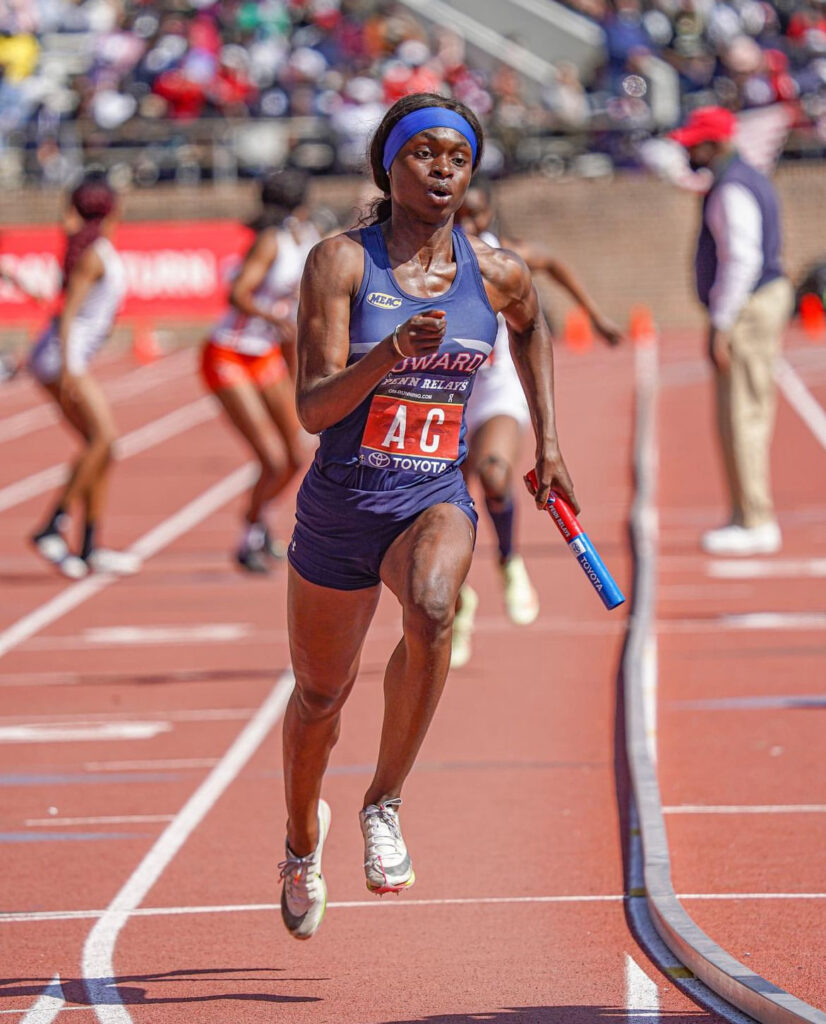
Howard University alumna Jessika Gbai gave a shocking performance at the 2024 Paris Olympics, running a personal best of 22.36 seconds for the Ivory Coast women’s track and field team in the 200-meter race semi-final, qualifying for the last round.
Gbai and Paralympic athlete, Sydney Satchell, are both graduates of Howard University and were two of six HBCU athletes competing in this year’s Olympic Games.
“It is very important for me to represent Howard University in the best way possible,” Gbai shared with The Hilltop. “I want to showcase the phenomenal talents that Howard University can produce. It is a university where one can attend and excel in both the classroom and sport.”
During her time at Howard, Gbai was a biology and political science double major, with a lifelong dream of becoming a medical doctor and building a hospital in Ivory Coast.
Gbai, who was born in the west African country, also competed with the Ivory Coast women’s 4×100 meter relay team.
Before making her mark on the world stage, Gbai walked on to the Howard track and field team during her freshman year in 2017.
“I remember staying up all night practicing how I was going to beg Coach David Oliver to just give me one chance,” Gbai said. “Luckily for me, since he came so late in the season, he allowed me to stay.”
Gbai said her performance at the Paris Olympics was not only for personal achievement. She wanted to pay homage and express gratitude to her coaches at Howard, Oliver, and Jessica Cousins, for the lessons they taught her and their dedication to her success.
“I want to show them that nothing was done in vain and that all those late nights and early mornings paid off,” Gbai said.
While Gbai’s athletic prestige displayed at this year’s Olympics took her personal success to new heights, she was actively challenging a narrative that HBCU-bred athletes cannot stand a chance against competitors who received their education and training at predominantly white institutions.
According to The Crimson White, misconceptions regarding the talent of HBCU athletics are rooted in the lack of facility and equipment funding, recruitment obstacles and minimal media coverage.
“Many HBCU programs aren’t given the opportunity to showcase their talents to the world,” Gbai said. “We have the talent and the skills to compete with the bigger universities…all we need is that one opportunity to do so.”
Howard University assistant athletic director for media relations & sports information Derek Bryant said the Bison have sent eight former track and field athletes to the Olympics, including Oliver who won a bronze medal at the 2008 Summer Games in Beijing.
Oliver, who is now the director of Howard’s Track and Field Program, believes that seeing Howard athletes at the Olympics proves to the world that Howard athletes can get things done and be the best.
“HBCU representation is extremely vital,” Oliver said. “It’s great to show that you might not have to attend your traditional power schools to make an impact at the pinnacle of the sport.”
Former Howard University Track and Field athlete and former teammate of Gbai, Ja’tae Joyner, believes that the biggest challenge that HBCU athletes face isn’t the lack of skill but the lack of representation.
“Despite there being a large population of Black, Indigenous and P.O.C. individuals competing in sports at the collegiate and Olympic level, the branding we most see are those of PWIs and not HBCUs,” Joyner said. “Jessika is telling her personal story with each race while telling everyone that athletes from HBCUs are capable, exceptional and seen.”
Bryant believes that the future of HBCU athletics is bright, given the visibility of HBCU athletes at the Paris Olympics.
“The narrative of HBCU athletics and Howard University athletics will shift tremendously upward in the U.S. and internationally because future student-athletes, in the next few years, will realize that you can get an outstanding education at an HBCU while competing against the best athletes at the collegiate and international level,” Bryant said.
Gbai said the unique challenges she has faced as the product of an HBCU can give similar athletes a “get it out of the mud mentality,” and she encourages the next generation of HBCU athletes to keep going.
“When the time comes, you’ll be more than ready. Never look at what you don’t have, but make the best of what you do have,” Gbai said. “Regardless of the outcome, you’ll always feel at peace knowing you gave 100% of what you had.
Copy edited by Camiryn Stepteau

